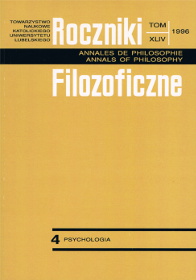Social Adjustment of Persons with a Different Level of Altruism
Abstract
The paper is a report on the empirical research dealing with the relationship between the level of altruism and social adjustment. Altruism is defined here as a voluntary behaviour in which a person does not expect any external awards and yet acts on behalf of other people. Such behaviour constitutes a value in itself for that person.
The following methods were used in the research: A-N Questionnaire to measure the tensity of altruism ⟨cf. Śliwak 1996a, 1996b⟩ and the California Personality Inventory (CPI) to assess the level of social adjustment.
By means of the above methods we sought to answer the following questions:
1. Are there statistically essential differences in the dimensions (scales) of social adjustment between altruists and the group with a lower level of altruism? 2. Is there a specific social adjustment profile in any of the groups in question?
160 subjects were examined (48.0% of women and 52.0% of men) the age-range was 22-36 (mean M − 27 years). 66.2% of secondary school graduates and 33.8% of university graduates were examined.
The following results have been attained:
1. The 10 scales of social adjustment yielded statistically essential differences between particular groups. They are the following: social ease, good mood, socialization, self-control, tolerance, a willingness to be accepted, success before conformism, success through independence and intellectual capacities.
2. In the altruistic group the scores of 12 scales are placed below the mean (5.5 sten), yet 6 scales are below the mean. The group with the lowest level of altruism in 7 scales gained scores higher than the mean, and in 11 scales lower scores.
3. The persons with a lower level of altruism proved worse adjusted in relation to the altruistic persons.
The scores have proved that there is a relationship between the level of altruism and social adjustment.
References
Berkowitz L.: Social Norms Feelings and Other Factors Affecting and Altruism. W:L.Berkowitz (ed.). Advances in Experimental Social Psychology. New York 1972 s.63-108.
Borucki Z.: Osobowość a przystosowanie zawodowe marynarzy. Warszawa 1986.
Czapów Cz.: Przystosowanie. „Wychowanie” 1961 nr 9 s.8-15.
Grzegorzewska M.: Pedagog w służbie dzieci niepełnosprawnych. E. Zabczyńska (red). Warszawa 1985.
Hurlock E.: Rozwój dziecka. Warszawa 1985. PWN.
Jaworowska A.: Rodzina a przystosowanie społeczne dziecka. W: L. Wołoszynowa (red). Materiały do nauczania psychologii. T. 9 s.101-109.
Kamiński S.: Comte August. W: F. Gryglewicz, R. Łukaszyk, Z. Sułowski (red). Encyklopedia Katolicka. T. 3. Lublin 1985 kol. 565-566. TN KUL.
Karyłowski J.: Explaining Altruistic Behavior: A Review. „Polish Psychological Bulletin” 8:1977a nr 1 s. 27-34.
Karyłowski J.: Koncentracja na sobie i zwartość „ja” idealnego a bezinteresowne działania na rzecz innych ludzi. „Studia Psychologiczne” 16:1977b nr 1 s.19-36.
Karyłowski J.: O dwóch typach regulacji czynności prospołecznych. W: J. Reykowski (red.). Teoria osobowości a zachowanie prospołeczne. Warszawa 1978. IFiS PAN.
Karyłowski J.: O dwóch typach altruizmu. Wrocław 1982. Ossolineum.
Kottas A., Markowska B.: Podręcznik do Kalifornijskiego Inwentarza Psychologicznego (CPI) H. Gougha. Warszawa 1968. Mps.
Krebs D. L.: Altruism − an Examination of the Concept and a Review of the Literature. „Psychological Bulletin” 1970 nr 4(73) s. 258-302.
Krebs D. L.: Altruism − a Rational Approach. W: N. Eisenberg (ed.). The Development of Prosocial Behavior. New York 1982.
Kukołowicz T.: Rodzina w procesie uspołecznienia dziecka. Lublin 1978. RW KUL.
Lewicki A.: Zarys biospołecznej teorii przystosowania osobowości. „Nowa Szkoła” 1966 s.31-35.
Macaulay J. R., Berkowitz L.: Overview. W: Altruism and Helping Behavior. New York 1970.
Midlarsky E.: Aiding Responses: An Analysis and Review. „Merill − Palmer Quarterly” 14:1968 s. 229-260.
Muszyńska Ł.: Altruizm a kolektyw dziecięcy. Warszawa 1976.
Obuchowski K.: Adaptacja twórcza. Warszawa 1985.
Pastuszka J.: Altruizm. W: F. Gryglewicz, R. Łukaszyk, Z. Sułowski (red). Encyklopedia Katolicka. T. 1. Lublin 1985. TN KUL.
Paszkiewicz E.: Ja a zachowanie. „Psychologia Wychowawcza” 1974 nr 2 s.192-210.
Potocka-Hoser A.: Wyznaczniki postawy altruistycznej. Warszawa 1971.
Pospiszyl K.: Niedostosowanie społeczne. Warszawa 1978.
Prężyna W.: Funkcja postawy religijnej w osobowości człowieka. Lublin 1981. RWKUL.
Przetacznikowa M.: Wiek przedszkolny. W: M. Żebrowska (red). Psychologia rozwojowa dzieci i młodzieży. Warszawa 1980. PWN.
Reykowski J.: Motywacja, postawy prospołeczne a osobowość. Warszawa 1979. PWN.
Rushton J. Ph.: Altruism, Socialization and Society. New York 1980.
Rushton J. Ph., Sorrentino R. M.: Altruism and Helping Behavior: An Historical Perspective. W: J. Ph. Rushton, R. M. Sorrentino (eds.). Altruism and Helping Behavior. New York 1981.
Skorny Z.: Proces socjalizacji dzieci i młodzieży. Warszawa 1976.
Szczepański J.: Elementarne pojęcia socjologii. Warszawa 1963.
Śliwak J.: Psychologiczne korelaty altruizmu endocentrycznego i egzocentrycznego. Lublin 1988. Praca doktorska − mps.
Śliwak J.: Altruizm a religijność człowieka − badania empiryczne. „Roczniki Filozoficzne” 41:1993a z. 4 s.41-52.
Śliwak J.: Zachowania altruistyczne w kontekście głównych teorii psychologicznych. W:A. Januszewski, T. Witkowski (red). Wykłady z psychologii w KUL. Lublin 1993b. RWKUL.
Śliwak J.: Altruizm a preferencja wartości − badania empiryczne. „Roczniki Filozoficzne” 43:1995 z. 4 s. 111-146.
Śliwak J.: Altruizm endo-egzocentryczny a poziom niepokoju. „Analecta Cracoviensia” 28:1996 (w druku).
Śliwak J., Król A.: Poziom altruizmu a poczucie sensu życia. „Roczniki Filozoficzne” 38-39:1989-1990 z. 4 s.189-210.
Śliwak J., Leszczuk P.: Poziom altruizmu a obraz siebie − badania empiryczne dorastającej młodzieży. „Roczniki Filozoficzne” 42:1994 z. 4 s.119-164.
Tatarkiewicz W.: Historia filozofii. T. 3. Warszawa 1978. PWN.
Tomaszewski T.: Rozwój wszechstronny i umiarkowany. „Psychologia Wychowawcza” 1976 nr 3 s.297-309.
Trzebiński J.: Osobowościowe warunki twórczości. W: J. Reykowski (red.). Osobowość a społeczne zachowanie się ludzi. Warszawa 1980 s. 105-132.
Walster E., Piliavin J. A.: Equity and the Innocent Bystander. „The Journal of Social Issues” 28:1972 nr 3 s.165-189.
Wispe L. G.: Positive Forms of Social Behavior: On Overview. „The Journal of Social Issues” 28:1972 nr 3 s. 1-19.
Wiśniewski W.: Przystosowanie do środowiska uczelnianego. Warszawa 1969.
Zaborowski Z.: Psychologia dostosowania. „Ruch Pedagogiczny” 1962 nr 1 s.118-123.
Copyright (c) 1996 Roczniki Filozoficzne

This work is licensed under a Creative Commons Attribution-NonCommercial-NoDerivatives 4.0 International License.





